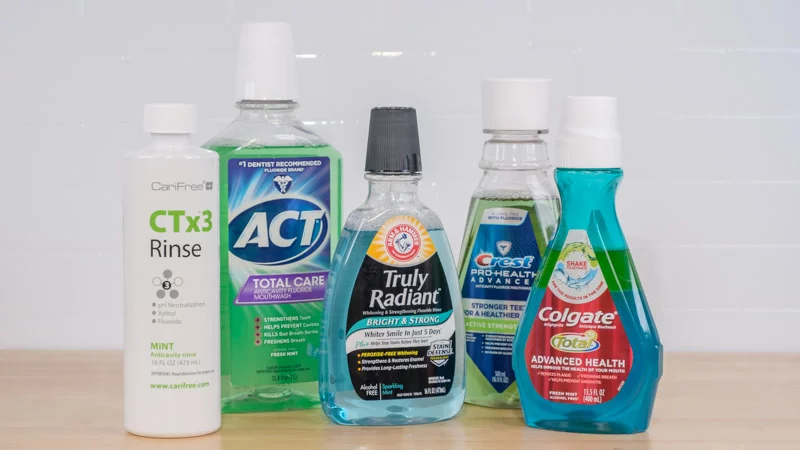When to use Mouthwash
Posted by: Jodie Blades Diploma Level 3 in Dental Nursing
Medically reviewed by: Vaida Buksnaityte Dip Dent Hygiene Kaunas 2003


”You should rinse with a fluoride mouthwash at a separate time to brushing
When should you use mouthwash?
Your dental hygienist will recommend if you need to include a mouthwash as part of your daily routine. If your mouth is healthy and you’re doing a great job with brushing and flossing alone, it might not be necessary. Speak to your hygienist at your next visit to be sure.
The common misconception is that you use a mouthwash after brushing. You should in fact, use a mouthwash at a separate time entirely. When you’ve finished brushing your teeth you should spit the remaining toothpaste and forgo any rinsing at all, even with water. If you rinse the residual toothpaste you will not get the benefits of the toothpaste, which are to strengthen your enamel and fight against tooth decay. Try using your mouthwash at lunch, or when you get home from work or school. This additional step in your oral hygiene regime will help to keep your mouth healthy and your breath fresh.
Alcohol vs Alcohol-Free Mouthwash
While most heavily advertised mouthwashes contain alcohol, studies have shown that alcohol-free mouthwashes have a better effect on the gloss, colour, hardness and wear of composite restoration.
If you suffer from a dry mouth or low saliva flow from medicinal side effects, radiation therapies or systemic diseases like diabetes or Sjogren’s syndrome, you will also benefit from using alcohol-free mouthwashes. Aside from a medicinal reason to switch, there are more benefits to using alcohol-free.
Alcohol mouthwashes kill ALL bacteria in your mouth, the bad and the good! Unless you are using the mouthwash consistently; the destruction of the natural balance of bacteria can lead to a build-up of bad bacteria. The imbalance can cause bad breath or a bad taste in your mouth and can actually cause the gum disease your mouth wash was trying to prevent.
If you’re wearing an orthodontic appliance you should not use an alcohol mouthwash. The alcohol dries out the metal, making it easier for the plaque to bind to it and harden into calculus. Hardened plaque can slow the movement of your teeth along the brace wire and can increase your risk of staining and gum disease.
While you may not get the “clean” (burning) sensation with an alcohol-free mouthwash you will target only bad bacteria and maintain a more favourable, healthy balance in your mouth.
Should you use a fluoride rinse?
A fluoride-free mouth wash will freshen your breath but it will not clean or protect your teeth. As we recommend using your mouthwash at a completely separate time to brushing you would benefit from using a fluoride mouthwash to help prevent dental decay and to strengthen your enamel. The fluoride in fluoride mouthwashes absorb into your enamel, protecting your tooth from acids produced by the bacterial plaque, but it does not replace your twice a day brushing and flossing.
This introduction of a fluoride mouthwash at a separate time to brushing is recommended for our orthodontic patients also. The rinsing will remove any food debris and the fluoride will fight the risk of decay and gum disease. And, let’s face it, braces are tricky to clean!
Mouthwash for Smokers
Keeping your breath fresh and your mouth healthy as a smoker is of more importance. Our hygienist Vaida, creator of Oral Health Net would advise that you use a slightly different mouthwash as a smoker; Peroxyl mouthwash from Colgate. Peroxyl contains hydrogen peroxide, this introduction of oxygen has an antibacterial effect and can aid gum health and protect against the damaging effects of smoking. It requires a tailored protocol so you should speak to your hygienist before using it. If you require smoking cessation advice your hygienist will also be able to help.

Sorry, the comment form is closed at this time.